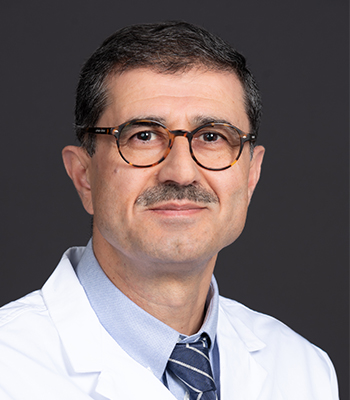Hasan Korkaya
Address
4100 John R. Street HWCRC723 Detroit, MI 48201Department
Oncology
Laboratory Web Site
https://sites.google.com/view/korkayalab/people
Research Interests
Tumor cell plasticity: It is now widely believed that cancers are driven by a subset of cells called cancer stem cells (CSCs) or tumor-initiating cells (TICs) that mediate metastasis, recurrence and treatment resistance. However, the emerging evidence suggested that the plasticity of CSCs between the EMT and MET phenotype has been associated with aggressive/metastatic property of solid tumors. One of the projects in the Korkaya lab aims to understand the spatiotemporal regulation of the CSC plasticity and identify critical players in these processes.
Tumor microenvironment and pre-metastatic niche: Although, the role of immunosuppressive TME/pre-metastatic niche in disease progression and treatment response has been well recognized, the molecular mechanisms that regulate these processes remain elusive. Preclinical and clinical data provide some evidence that immune cells of myeloid origin (macrophages, neutrophils, MDSCs) are major components of the TME and may play role in resistance to ICIs. A recently funded project in the Korkaya lab aims to dissect the molecular mechanism by which stress-induced HSP70 regulates both protection of tumor cells from cytotoxic agents (including CTLs) by regulating the CSC plasticity and generates an immunosuppressive TME/pre-metastatic niche via the modulation of immunosuppressive myeloid cells. The team aims to investigate whether targeting HSP70 using the new generation allosteric inhibitors will sensitize tumor cells to standard of care including the ICIs and induce immune-stimulatory cells within the TME/pre-metastatic niche to activate effector T cells.
Additional research interests include:
1. Development of patient-derived xenografts (PDXs) and organoids
2. Syngeneic mouse models and their utility in determining the efficacy of ICIs
3. Development of the tumor dormancy models
4. Mechanisms of therapeutic resistance
Research Description
Research in the Korkaya lab focuses on the understanding of the early molecular events during the metastatic cascade. Unfortunately, women with metastatic disease have limited treatment options and shorter lifespans compared to those with indolent tumors. Current understanding of the metastatic process suggests that successful metastatic colonization in distant organs requires disseminated mesenchymal stem cells (EMT/CSC) to revert back to the epithelial phenotype (MET/CSC) via mesenchymal-epithelial-transition (MET). Ongoing research in the Korkaya lab provided some evidence that these processes might be regulated by the cross-communication between the tumor cells and immunosuppressive myeloid cells within the tumor microenvironment (TME) and premetastatic niches. The major focus going forward will be to identify key molecular players in each stage of the metastatic cascade and testing their therapeutic utility in preclinical settings.
Recent Publications
Fulya Koksalar Alkan and Hasan Korkaya. Therapeutic utility of immunosuppressive TREM2+ macrophages: an important step forward in potentiating the immune checkpoint inhibitors. Signal transduction and Targeted Therapy 2020;10:264.
Eunmi Lee, Raziye Piranlioglu, Max S. Wicha and Hasan Korkaya*. Plasticity and potency of mammary stem cell subsets during mammary gland development. International Journal of Molecular Sciences 2019;20:2357.
Raziye Piranlioglu, Eunmi Lee, Maria Ouzounova, Ali Arbab, John Cowell, Muthusamy Thangaraju, Ahmed Chadli, Khaled Hassan, Max S. Wicha, Esteban Celis and Hasan Korkaya*. Primary tumor-induced immunity eradicates disseminated tumor cells in syngeneic mouse model. Nature Communications 2019:10:1430.
Eunmi Lee, Maria Ouzounova, Raziye Piranlioglu, Minh Thu Ma, Mustafa guzel, Daniela Marasco, Ahmed Chadli, John K. Cowell, Max S. Wicha, Khaled Hassan and Hasan Korkaya*. The pleiotropic effects of TNFa in breast cancer subtypes is regulated by TNFAIP3/A20. Oncogene 2019;38:469-82.
Education/Training
International Center for Genetic Engineering 1999-2002 Ph.D. Molecular Biology and Biotechnology (New Delhi/India)
Center for Biotechnology 1996-1998 M.Sc. Biotechnology Jawaharlal Nehru University (New Delhi/India)
Faculty of Veterinary Medicine 1988-1993 DVM Veterinary Medicine Istanbul University (Istanbul/Turkey)
